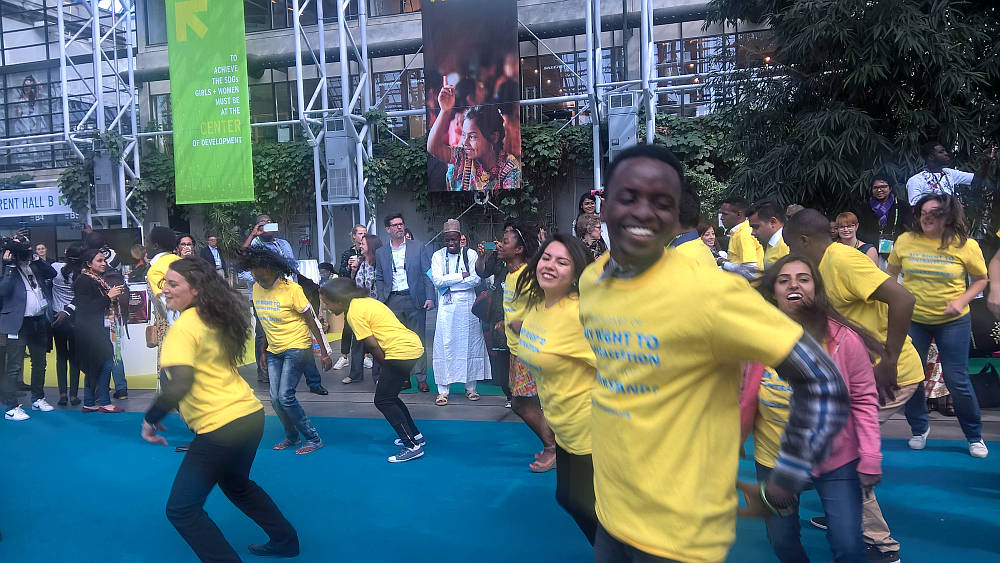
I’m just back from the Women Deliver conference in Copenhagen, a convening on the health, rights and well-being of girls and women that takes place every three years. The conference dynamically engaged some 5,500 people from 169 countries, with 20% under 30 years of age and all of whom came with their energy, ideas, strategies and solutions for change.
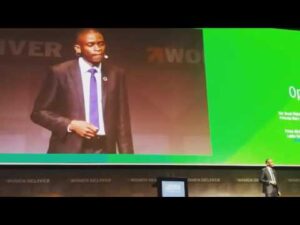 One of the participants under 30 was Yemurai Nyone, Founder and Advisor, Dot Youth Organization and 2013 Women Deliver Young Leader, Zimbabwe who spoke at the opening plenary and who said “My strength [as a man] is not defined by the weakness of others. My partner can be the fullest expression of herself – not for me but for herself. I believe our countries will be better for it.”
One of the participants under 30 was Yemurai Nyone, Founder and Advisor, Dot Youth Organization and 2013 Women Deliver Young Leader, Zimbabwe who spoke at the opening plenary and who said “My strength [as a man] is not defined by the weakness of others. My partner can be the fullest expression of herself – not for me but for herself. I believe our countries will be better for it.”
Also at the opening plenary, singer Annie Lennox spoke about the need to do so much more to address HIV/AIDS which had become a forgotten issue at the very time it is increasing in many parts of the world. Lennox was a force. Authentic and true. Like Patti Smith. As I watched her, I imagined a new organization called Artists for Activists, with artists fueling funds and forums to support activists on the ground to speak and act with the resources to sustain this work.
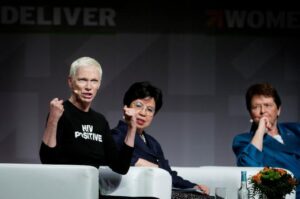 At the conference Melinda Gates announced an $80 million commitment from the Bill & Melinda Gates Foundation to help close gender data gaps to accelerate advancing women’s and girls’ human rights. It brought back memories of making the case to the Australian Government in 2009 to invest in women’s research hubs in Asia and the Pacific for the same reason.
At the conference Melinda Gates announced an $80 million commitment from the Bill & Melinda Gates Foundation to help close gender data gaps to accelerate advancing women’s and girls’ human rights. It brought back memories of making the case to the Australian Government in 2009 to invest in women’s research hubs in Asia and the Pacific for the same reason.
It’s so important to have this data and, in the spirit of what Mohammed Yunus said to young people at the conference — to see themselves as job creators and innovators rather than job seekers — I hope women in communities across the globe can be co-researchers and co-creators of data capture in support of their knowledge, experience and networks. And that they can help define what data is captured, and how it is recorded and used.
Melinda Gates is also involved in another new initiative introduced at the conference. Called the Maverick Collective, it’s described as a ‘groundbreaking philanthropic and advocacy initiative aimed at catalyzing the next wave of social investors to improve the health and rights of girls and women worldwide’. Co-founded by Kate Roberts Senior Vice President, Corporate Partnerships & Philanthropy at PSI and Her Royal Highness Crown Princess of Norway Mette-Marit and co-chaired by Melinda Gates, the collective is intended ‘to drive strategic investments that go beyond the checkbook by engaging the time and talents of philanthropists.’
This is what’s happening now, donors want to be more than just ‘walking ATMs’ to use a phrase coined by Jessica Houssian from Women Moving Millions. Donors want to be engaged as thought leaders and strategists advocating for and influencing, social change outcomes.
With $14 million committed to date from 14 women giving one million each, the Maverick Collective represents the new way of organizing for change. I hope the funds get to grassroots women’s groups at a time when they’re most needed. Especially when institutional donors are pulling out of some regions, such as Latin America and the Middle East. In the Middle East, European governments are redirecting funds they were providing to UN agencies working with refugees in countries such as Lebanon to back to Europe to address the refugee situation there rather than funding work in both regions.
One of Global Fund for Women’s advisors told me that this is precisely the time where Islamist groups are ramping up their funding to support groups working in the refugee camps. So, at the very time when there is a deep need to invest in civil society infrastructure and organizing inside and outside refugee settlements to deal with the safety, security, health, education, and livelihood needs of women and their families, western donors are failing them and Islamist groups are stepping in to fill the breach.
I think about what happened in Nigeria when women’s groups in Nigeria and neighboring countries were sounding the alarm more than a year before Boko Haram kidnapped the girls in Nigeria. Women’s movements were asking for funds to shore up a strong grass roots women’s movement across the region in order to create the infrastructure for security and protection, advocacy, and action to build systems of ground support and intelligence.
Donors weren’t much interested in providing funding to these countries until the kidnapping of the girls changed all that. Now we have a situation in the Middle East where women’s groups working in and around the refugee settlements in Lebanon and surrounding countries are seeking funds to support and sustain their activism to bring about change and remain connected to women’s movements. And yet funds are flowing away from these groups, away from these countries, at the very time that civil society needs strengthening.
 In Egypt the government is withholding funds to women’s groups for many months and they are finding it very difficult to continue to operate when they have to pay fixed costs such as rent in order to have a safe space to meet and organize. Without this ability to organize there will be a further erosion of the really important work being undertaken to engage religious and faith based leaders to influence their oratory and their actions. There will not be the opportunity to increase women’s civic and political leadership, to advocate for new policies and practices to address the violence, and to increase women’s access to health information and services and to livelihoods.
In Egypt the government is withholding funds to women’s groups for many months and they are finding it very difficult to continue to operate when they have to pay fixed costs such as rent in order to have a safe space to meet and organize. Without this ability to organize there will be a further erosion of the really important work being undertaken to engage religious and faith based leaders to influence their oratory and their actions. There will not be the opportunity to increase women’s civic and political leadership, to advocate for new policies and practices to address the violence, and to increase women’s access to health information and services and to livelihoods.
There is so much talk and energy around women’s and girls’ empowerment and yet the amount of funds going to grassroots women’s groups is decreasing. The funds being directed from governments to support women’s and girls’ empowerment are largely project based and they are mainly being channeled through for-profit companies and international NGOs rather than via women’s organizations that are directly connected to women’s groups on the ground. And many international NGOs are shifting from situating themselves as grantmakers to focusing on being convenors of influence, which has the promise of mobilizing more resources and yet often means less funding getting into the hands of women’s groups even though the intent may be there.
It’s not just that funds aren’t getting to grassroots women’s groups to support them to sustain and extend their work. It’s also that being nice and expecting to get a fair slice of the funding pie isn’t working. While UN Women was created to powerfully advance women’s human rights, it needs millions more to achieve its vision and charter and yet it receives much less funding than other UN agencies.
At the same time, governments are directing massive funds to for-profit companies to manage their funds for development programs rather than this funding being directed to women’s organizations that have deep experience in grantmaking, especially with hard to reach groups working with the most isolated and marginalized communities. The funds being disbursed by governments are at such a high level that its more expedient for these managing contractors to grant funds to large groups in-country that have the systems in place to absorb such funds. To be funded groups also need to and demonstrate a level of governance and risk management to acquit funds at this level and demonstrate impact in the way defined by government donors. In such a landscape the casualties are the small, cutting edge grass roots groups that are seeding new ideas or seeding themselves as rising activists for change.
At Women Deliver the power of young people was like an electric current running throughout the conference – in the breakout spaces and breakout dancing as much as in the formal sessions and presentations. They were occupying space, defining issues and power on their own terms, turning up the volume on their views and voice. It was a transmission of energy and power and it was such a gift.
 So, we must hope that this new generation will flip power on its head and create solutions that really do deliver gender justice in the way Yemurai Nyone articulated in the opening plenary session.
So, we must hope that this new generation will flip power on its head and create solutions that really do deliver gender justice in the way Yemurai Nyone articulated in the opening plenary session.
I’ve been thinking about power in all its forms and, in this respect, I’ve learnt a lot about personal power from one of my dearest friends, Kate. Specifically the need to unlock blocks in order to lean into our power, step into our power and to be held to account for this power and, in so doing, to feel our heart sing… This idea kindles in me the vivid images from reading Clarissa Pinkola Estes book, Women Who Run with the Wolves, many moons ago.
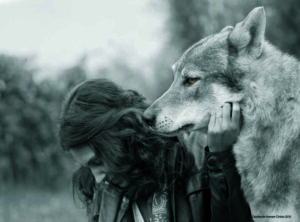 In her book, Dr. Estes invokes the qualities of the archetypal wild woman from stories and fairy tales; qualities that she says have been consistently tamed by a society that advocates the virtue of being “nice.” She found the comparison of woman and wolf while studying wildlife biology. “Wolves and women are relational by nature, inquiring, possessed of great endurance and strength,” she writes. “They are deeply intuitive, intensely concerned with their young, their mate and their pack.” She also writes: “Yet both have been hounded, harassed and falsely imputed to be devouring and devious, overly aggressive, and of less value than those who are their detractors.”
In her book, Dr. Estes invokes the qualities of the archetypal wild woman from stories and fairy tales; qualities that she says have been consistently tamed by a society that advocates the virtue of being “nice.” She found the comparison of woman and wolf while studying wildlife biology. “Wolves and women are relational by nature, inquiring, possessed of great endurance and strength,” she writes. “They are deeply intuitive, intensely concerned with their young, their mate and their pack.” She also writes: “Yet both have been hounded, harassed and falsely imputed to be devouring and devious, overly aggressive, and of less value than those who are their detractors.”
Clarissa Pinkola Estes defines wildness as a kind of savage creativity. “You must become an activist if you are going to live the natural life,” she added, referring to being closer to one’s true self… “Otherwise you fall to the song of the starved soul, the hambre del alma.”
This invitation to reclaim power as feminists is so important. Of connection and exploration, wildness, togetherness and community. Of stepping up our organizing, being assertive, strategic, untamed and unstoppable.
That’s why the work of the new Centre for Women, Peace and Security at London School of Economics is so important, especially its new activist in residence program to provide a space for women’s human rights activists to engage with the centre. As a member of the Advisory Board, I was so happy to be able to catch up with Professor Christine Chinkin, Director of the Centre, and with Zoe Gillard, Centre Manager, where they had just announced the appointment of four visiting professors in practice to the centre: Jane Connors, Director of International Advocacy at Amnesty International Geneva, William Hague, former UK Foreign Secretary, Angelina Jolie Pitt, UNHCR Special Envoy, and Madeleine Rees, Secretary General of the Women’s International League for Peace and Freedom. It’s a hugely exciting time to be involved with the centre as it galvanizes support and involvement to drive and deliver a strong curriculum and engagement program.
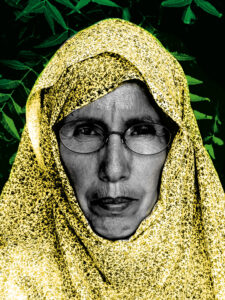
Later, I spend time with Negar Esfandiary, an oral historian who has been working for Women’s Learning Partnership to capture the stories of activist leaders in the women’s movement. Activists like Aminetou Mint El Moctar Ely who escaped the Mauritanian tradition (that is still happening at this very moment) of sending girls to feeding farms to force feed them and fatten them for forced marriage — like lambs to the slaughter. Instead, Aminetou became a highly vocal and active defender of women’s human rights in Mauritania and globally.
The stories are so compelling that the British Library has now bought the rights. As Negar says, the testimonies of these women are of cinematic quality and deserve to be films in their own right. I imagine a series of short films on these activist leaders created by some of the most renowned established and upcoming filmmakers in order for the whole world to get a grip on the power, courage and organizing ability of women organizing for gender justice globally.
People need to be exposed to the ideas and advocacy of these women to know the full power and potential for societal change that is possible when these views and visions are embraced. We all have a responsibility to seek out ways for the voices of those representing the most marginalized, radical and revelatory to be heard.
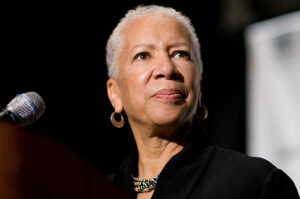 It reminds me of the phenomenal address given by Angela Glover Blackwell, President and CEO of Policy Link, where she said
It reminds me of the phenomenal address given by Angela Glover Blackwell, President and CEO of Policy Link, where she said
“The problem isn’t those being left behind – the problem is those who are comfortable leaving people behind…you are not going to be who you claim to be if the thing that defines you is those who are left behind.”
The academic, Kimberlé Crenshaw, spoke to this too at the important London School of Economics International Inequalities Institute Annual Conference where she critiqued an exclusive focus by the Obama administration on lifting young boys out of poverty without any focus on girls because, the President said, girls were doing fine. However the research showed otherwise and it led to a Black Girls Matter movement rising with the slogan Our Girls Are Not “Just Fine” – Break the Silence.
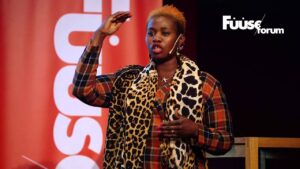 Two women I met at the Women Deliver conference are also breaking the silence on female genital mutilation (FGM). Sariam Karim Kamara, is an FGM Survivor from Senegal, now living in London in an area that has the highest number of FGM survivors in the country. She is also founder of an organization called ‘Keep the Drums, Lose the Knife’. In telling her story, Sariam says,
Two women I met at the Women Deliver conference are also breaking the silence on female genital mutilation (FGM). Sariam Karim Kamara, is an FGM Survivor from Senegal, now living in London in an area that has the highest number of FGM survivors in the country. She is also founder of an organization called ‘Keep the Drums, Lose the Knife’. In telling her story, Sariam says,
“I was 11 when I was cut. I was taken by my grandmother – together with 15 cousins during the dry season – since after you are cut you need time to heal and it’s harder during the raining season. We had a sense of something about to happen but no real understanding. We were really excited as we’d prepared for this moment for the last year and we knew we were being inducted to Bondo society (female secret societies that exist across Sierra Leone, where almost 90% of women in the country are members).
‘In Sierra Leone the practice of FGM, the cutting that girls are subjected to, is only part of a long rite of passage, a long journey, much of which is valuable. We want to keep the rituals, the books, the drums, the dancing, the ceremony and the learning. We want to end the cutting. That’s why I called my group ‘Keep the drums, lose the knife.’ When we come together in this space, everyone is comfortable and there are no barriers and no difference. But with the cutting comes separation and searing pain.
‘If I had between $50,000 and $100,000 I would embark on a community engagement campaign in Sierra Leone to talk with the cutters and the religious leaders. It’s critical to involve the Paramount Chiefs as they are the ones that give the traditional licenses and so they are very powerful. Governments can’t touch them and yet these Chiefs touch every area.
‘What’s important with this issue is to get people talking, to tell their stories and to break the silence on the violence. This means sending women and men out into the community voluntarily to face the issue. Engaging the diaspora community and local communities is the key. It’s also important to give women a safe space and platform to tell their stories and to also learn how to heal and regain confidence and voice, and to rise up.”
What has also been critical has been supporting grass roots movements in the country to advocate for Sierra Leone to ratify the Protocol to the African Charter on Human and Peoples’ Rights on the Rights of Women in Africa that explicitly bans FGM. This was finally achieved in July 2015 when Sierra Leone finally ratified the treaty. Now activists are working to get the government to implement the treaty and pass a national law explicitly banning FGM.
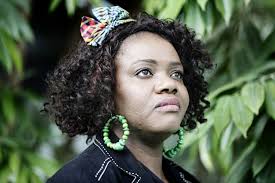 I also spoke with Alimatu Dimonekene, another FGM survivor and founder of Project ACEi working to end FGM. Alimatu was also born in Sierra Leone and is now living in London. She was asked by the Prime Minister of Britain and Baroness Lynne Featherstone to share her story at the Girl Summit that took place in London in 2014 to highlight key issues affecting girls. Reflecting on that time Alimeku said “I was quite nervous but I knew it was important. I was also interviewed by BBC Radio One presenter, Vanessa Felts, who said “we really want the world to know what is happening” and that set the tone for the interview and her program.
I also spoke with Alimatu Dimonekene, another FGM survivor and founder of Project ACEi working to end FGM. Alimatu was also born in Sierra Leone and is now living in London. She was asked by the Prime Minister of Britain and Baroness Lynne Featherstone to share her story at the Girl Summit that took place in London in 2014 to highlight key issues affecting girls. Reflecting on that time Alimeku said “I was quite nervous but I knew it was important. I was also interviewed by BBC Radio One presenter, Vanessa Felts, who said “we really want the world to know what is happening” and that set the tone for the interview and her program.
“The publicity has been important however the media and celebrities from the Girl Summit have long gone and we’re still struggling to attract funds as grassroots women’s groups. The bigger organizations don’t always reach the communities we reach and that’s a big issue. I’m paying for myself to do the work here and in Sierra Leone but so much needs to be done, especially in rural areas.”
“There are all the issues related to FGM including menstrual hygiene, access to education and safe access to water and sexual abuse and child marriage of very young girls. These girls are specifically targeted because they have undergone FGM.
For instance, in many communities in Sierra Leone, there is a severe water shortage and so girls are approached by men and boys to have sex in exchange for a bucket of safe drinking water. And so they engage in risky sexual relations, exposing themselves to HIV/AIDS, pregnancy and STIs (sexually transmitted infections) in return for fresh drinking water.
It is only grassroots groups’ who know these communities, much more than the big organizations who only come for a few days and leave. Our work can really bring these issues to the fore as we know what needs to be done to address these situations.”
I ask Alimatu what she would do if a donor gave her $100,000.
“I would create a center in Sierra Leone to help girls and women deal with these issues. A center where we would share stories in person and via video to encourage girls and women to tell their experiences. A place where girls and women can get therapeutic support, learn new skills and build their self-esteem and confidence to help them break free of this cycle of abuse.
‘What I have here in the UK is access to skilled, trained health professionals. Every woman and girl should have this access. In Burkina Faso, women are not able to express that they are unhappy and so there is no outlet for their pain and grief. There is no outlet for them to express their experience of the violence perpetrated, their low self-esteem, or that they can’t get an education or a job.
‘If I were creating this center for women in Sierra Leone, I would create it in the image of a butterfly. Before it becomes a butterfly, it is a caterpillar which is prickly and hairy and wiggly. Then the caterpillar is left alone in a cocoon to think about what it wants to become, as a kind of incubation period, and then before you know it, out comes a butterfly with beautiful colors — rising, flying, transformed.”
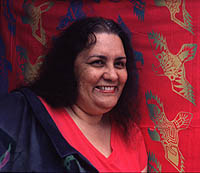 When we stay close to women connected to their communities, the best ideas and journeys happen. I’ve been receiving updates from my friend, Lenore Dembski, and the Aboriginal and Torres Strait Islander Women’s Fund she’s heading in Australia and the amazing textile artists this fund is supporting. This is a fund built on relationships between artisans and donors. I imagine what it would be like to create a Global Women Artisans’ Fund – from artisan oil producers providing a human scale alternative to big oil and fossil fuels to artisan tea makers and textile producers.
When we stay close to women connected to their communities, the best ideas and journeys happen. I’ve been receiving updates from my friend, Lenore Dembski, and the Aboriginal and Torres Strait Islander Women’s Fund she’s heading in Australia and the amazing textile artists this fund is supporting. This is a fund built on relationships between artisans and donors. I imagine what it would be like to create a Global Women Artisans’ Fund – from artisan oil producers providing a human scale alternative to big oil and fossil fuels to artisan tea makers and textile producers.
There’s no dedicated fund to connect a global network of women artisans and to support them to adapt and collaborate in ways that support human scale enterprise and self-employed worker rights. If there were such a fund it would help with exchanges between artisans and provide more ways to direct resources to support artisan collaboratives and artisan maps where people could click to create their own artisan study tours and by so doing help women to sustain livelihoods and create opportunities for others.
 After the Women Deliver conference I headed to Norway to discuss funding for women’s groups in the Middle East, and a partnership for a women’s climate justice initiative aimed at lifting up women’s leadership on issues of food, water and land security. This includes leadership on small scale organic farming. As George Monbiot says in his latest book, How Did We Get Into This Mess,
After the Women Deliver conference I headed to Norway to discuss funding for women’s groups in the Middle East, and a partnership for a women’s climate justice initiative aimed at lifting up women’s leadership on issues of food, water and land security. This includes leadership on small scale organic farming. As George Monbiot says in his latest book, How Did We Get Into This Mess,
“There is an inverse relationship between the size of farms and the amount of crops they produce per hectare. The smaller they are, the greater the yield. If governments are serious about feeding the world, they should be breaking up large landholdings, redistributing them to the poor and concentrating their research and funding on supporting small farms….The structure of the global food movement is changing so rapidly that fair trade is now becoming one of the few means by which small farmers in poor nations might survive.”
In the village of Arendal where I had meetings regarding women’s leadership in relation to climate change impact, I was captivated by the work of Professor Elaine Barker, a UNESCO Chair in Ocean Governance who is strategizing to address the global race to gain mining rights to mine the deep sea floor. She is also part of a team that has produced the first new global seafloor map in forty years. Professor Barker’s framing and response is vital policy work that will influence ocean ecosystems for decades to come and hers is an important voice in influencing the outcomes.
That night, after my meetings finished, an almost full moon rose over the water as small ferries chugged across the bay. At 3.00am I bumped down cobblestone streets with my bag and with Elaine as my moonlit guide to get me to the bus stop to catch a bus for an early morning flight. My hour long bus ride to the airport was revelatory. A white-blue wonderland unfurling, like a space capsule delivering me into a hushed new world.
On my flight home I read Thomas Frank’s book, Listen Liberal, and joined the dots between his take on what happens when the US Democratic party loses its interest in working people and what I see playing out in the field of women’s human rights. That’s a story for my next blog.
In less than a day, and now full circle, I’m back in Sausalito again.
Home to artists, activists and sustained creativity. And also, mercifully, a sacred sanctuary. I put down my bag and tip my head to sky and stars. The view across the bay has a gauzy, dreamy quality to it, and my boat feels lit from behind in a translucent wash of light … and me, I’m lit from within.
I step out on the hull and turn, turn, turn to the tiny bud lights of Sausalito. Here at night it’s velvety…mysterious…inky blue…and with the promise of a magic carpet ride if I can let myself fly … the bluest blue…I tip closer to the light and the magic is right there winking back at me.
Jane Sloane
San Francisco
One Response
Many thanks for highlighting the work we do at ProjectACEi. The World Deliverance Conference in Copenhagen gave us an enormous platform to show the world what it means to inspired girls to become powerful women of the future.